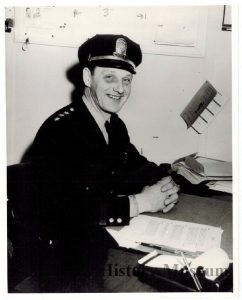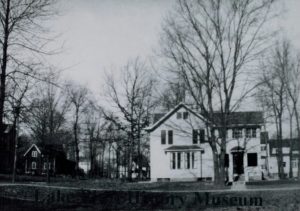The police report doesn’t specify what the weather was like that night in late January 1949 when a 10-year-old boy fell into Lake Michigan. We can imagine the conditions based on what we know from our own Januarys here, and from historical weather data, newspaper accounts, and details in the police report.
It was around 5 pm on January 28, 1949, at the frozen tundra that was Lake Bluff beach. Darkness was sinking into the indigo of daylight, and two local boys who should have been anywhere but there were playing on ice that extended out onto the lake 50 feet from shore. It was thick enough for them to stand on but not so solid that it could hold them for long. Eventually an ice floe broke away, launching the older boy out onto the lake. Waves carried him 300 feet south until he fell into the freezing, choppy water.
The water would have been 32 degrees or thereabouts on that mid-winter evening. The air temperature was 20 degrees, with a west-by-northwest wind at 29 mph, high waves, a waning crescent moon, and no snow.
The younger boy tried to grab his friend several times but couldn’t reach him, so he made the crucial decision to leave the beach and go for help. As he ran up the bluff, all he could see of his friend was his head being pummeled by waves. He feared the boy was drowning.
The first house he came to was on the southwest corner of Center and Sunrise avenues; there, he desperately told the woman who answered the door of his friend’s plight. By then it was 5:15 pm. Homeowner Laura Kuehne immediately called the Lake Bluff police.
Police Chief Christian Elfert took the call either from his home at 309 Scranton Avenue (emergency calls rang in the home of the police chief) or the LBPD office in Village Hall (where the police station was located until 1988). He ran to the department’s only squad car, a four-door deluxe Plymouth Sedan, and raced east on Center Avenue, parking on the bluff because it wasn’t possible to drive down to the lake. In his car were three Army blankets for emergencies, which he brought with him. About halfway down the bluff, he scanned the lake and saw the boy “with the waves beating him around.”
Alone and knowing the conditions were treacherous, Elfert proceeded out toward the boy, but the ice cracked and the chief found himself in knee-deep water. He was able to get back up, “aware that minutes counted and that he had to get that boy out.” He then stretched out on the ice and pulled himself to the edge.
Elfert rolled a blanket and threw it to the boy, telling him to keep his head up and hold on. But this didn’t work—the boy said his hands wouldn’t move. As waves crashed over them both, Elfert threw the blanket out again, this time telling the boy to put it in his teeth. The boy couldn’t do that either; he was unable to move his body at all.
Elfert inched out over the ice as far as he could without falling into the water and grabbed for the boy as a wave pushed the youngster forward.
“I had a hold on him but because his jacket was frozen stiff it tore, and he got away,” he wrote in the police report. “The waves were very high, and they were washing over the ice on me and also washing over the boy’s head.”
The chief tried to reach the boy again with the next wave, and this time he got a firm hold on the boy’s arm.
Elfert started edging back over the ice on his stomach while pulling the boy, who was “absolutely helpless and frozen,” but he encountered another obstacle: the boy’s legs were bent at the knee and got caught under the ice.
After moments that must have seemed like hours at the precipice of failing ice and crashing waves, the police chief was able to get the boy’s heavy body out of the water and back to shore. Once on solid ground, he immediately wrapped him in the dry blankets.
At this point, the boy’s father and the Lake Bluff Fire Chief arrived and helped carry the boy up the bluff and into the Kuehne residence. There they stripped him of his ice-covered clothes and placed him in a bathtub filled with cold water. The village physician, Dr. John L. Ward, was summoned, and he arrived within five minutes.
The boy was identified as Bert Leach, age 10, of 516 E. Center Avenue. He suffered cold exposure and shock, but he survived. His friend and neighbor was Lee Dole, age 7, of 600 E. Center Avenue.
Chief Elfert later earned the Illinois Policeman’s Association’s Distinguished Service award and a check for $100 for his heroism in saving the boy’s life. But he credited the quick-thinking of young Lee Dole for being the real hero that January night in Lake Bluff, when life nearly met death but encountered courage instead.




